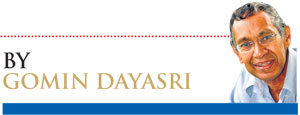Reply To:
Name - Reply Comment
 le
le ction procedure is flexed in such a manner the day is not too far away, when the Northern Province determines the declaration of the next President of Sri Lanka. Token assistance will be required from the Eastern Province to make it definitive and that will be forthcoming.
ction procedure is flexed in such a manner the day is not too far away, when the Northern Province determines the declaration of the next President of Sri Lanka. Token assistance will be required from the Eastern Province to make it definitive and that will be forthcoming.
This would have been conclusively established in 2005 if Prabhakaran did not prevent the people of the North from exercising their franchise. That was the election that Mahinda Rajapaksa won by a whisker. He obtained a mere of 0.2% above the required 50% of the valid vote. At that election Mahinda Rajapaksa obtained 4,887,152 votes (50.2%); Ranil Wickremasinghe polled 4,706,366 votes (48.4%). Mahinda Rajapaksa became President on receiving 28,632 votes more to vault over the mandatory 50% barrier [Difference between 50.2% and 50%]. Otherwise it would have required a second count to determine the second preference.
At that election, in the Jaffna District only 1.2% of the registered voters cast their votes of which 70% were in favour of Ranil Wickremesinghe while in the Wanni District 34.3% of the voters cast their ballots of which 77% of the vote went in favour of Wickremesinghe. If the franchise was exercised freely in the North, Ranil Wickremesinghe would have been the President. The prohibition sealed the flow of votes to Wickremesinghe and made him the loser which otherwise would have established him as the sure winner at a close election. History may not have been altered for the better.
That was an election Prabhakaran could have fabricated to select a President of his choice. Indeed he did so implicitly by not allowing the northerners to exercise their franchise, knowing well the trend in the North was for Wickremesinghe, which he aborted and did select the ultimate winner. Believe it or not, Prabhakaran unintentionally maneuvered the northern vote to stay with the southern vote and made the choice of the South to prevail without permitting the North to express their free will. He felt Ranil Wickremesinghe with his international connections would pose a greater threat to him. It was one of the many colossal mistakes that he made that led to his downfall and spiked history.
.jpg)
The Northern Province enjoys a unique position -- it’s a virtual single party province (except for the presence of Douglas Devananda and the EPDP faintly around the islands) consisting predominantly of one ethnic group with no other formidable northern political parties/independent groups to rival the TNA. At the last provincial council elections on a poll of 353,595 votes, the TNA received 78.4% of the vote. The TNA is capable of diverting the major portion of the total vote of the North (of the 719,477 registered voters at the provincial council elections in 2013, 450,574 voted for several political parties -- 67.5% voted) to a candidate of their choice in a close election, which makes the southern beneficiary the winner with the flow of a bulk vote unseen in other districts where elections are more competitive. At a heavier poll in the North, the TNA’s exclusive vote bank could reach 375,000 to 400,000 votes. In addition, at the provincial council election in the Eastern Province, the TNA collected 193,827 votes. Therefore the TNA has a vote bank of around 575,000 to 600,000 votes to offer to the South. This is tough to set off against the southern majorities unless there is a high swing towards a candidate.
The TNA has another option that is to present a candidate of their own to collect the maximum number of votes and tilt the preferential votes to the favoured candidate of their choice in the South. This is unlikely as it is cumbersome and could carry a hiccup.
In a nutshell the South can elect a candidate of their own choice without compromising the North only if at the presidential election of 2014/15 (a) the polling is heavy in the South (b) the winner carries the South comprehensively (except for a few urban electorates) and (c) with large majorities in friendly electorates: to offset the bulk vote of around 575,000 to 600,000 from the North aided by the East where the Tamils vote in a uniform pattern. In short, it has to be a repetition of a slightly less rigid replay of the 2010 presidential election situation. The South is capable of angrily reacting to northern manipulations and grounding it by a pre-emptive voting display.
Alarm bells would ring less loud if the preferred candidate of the Northern vote is elected as the President: if it were at a hotly contested close election in the south as was in 2005. In such a case either candidate could win or nearly win the election in the South but with the help of the North/East the winner is nudged ahead, yet holds substantial support in the South to be acceptable especially in the Sinhala Buddhist electorates.
However if at a presidential election the South votes comprehensively in favour of one candidate but yet the majorities are not fat enough to overtake the bulk one -- way street vote from the North aided by the East, it could lead to a perilous situation. The ugly head of ethnicity would rise again to make governance after an allegedly contrived election wary with a possible backlash. Such a government has a short life expectancy and a resulting election could be fought on a strict ethnic dimension that is unhealthy for the reconciliation exercise. More so if such projections are featured it could lead to tactical voting patterns emerging in the North and South with conflicting results emerging on either side of the aisle at an election.
Tamils of the North/East have the right to vote according to their preference, which is their scared democratic right; whoever they vote for is their right in exercising the franchise according to their choice. the TNA as the prime political party of the North has the right to give them leadership and issue directions unlike in LTTE times where they were under command.
Instead,the blame should be laid at the feet of Prabhakaran for denying the people of the North their right to exercise the franchise. However that blame need to be shared with the TNA; for they meekly followed the dictates of the LTTE and acted as their visible agent. Suspicion is aroused in the minds of those in the South that the TNA while now enjoying the fruits of democracy and holding office that was denied to them by Prabhakaran is trying to reach the goals through a democratic process which would result in a more divided Sri Lanka withing an ethnic framework.